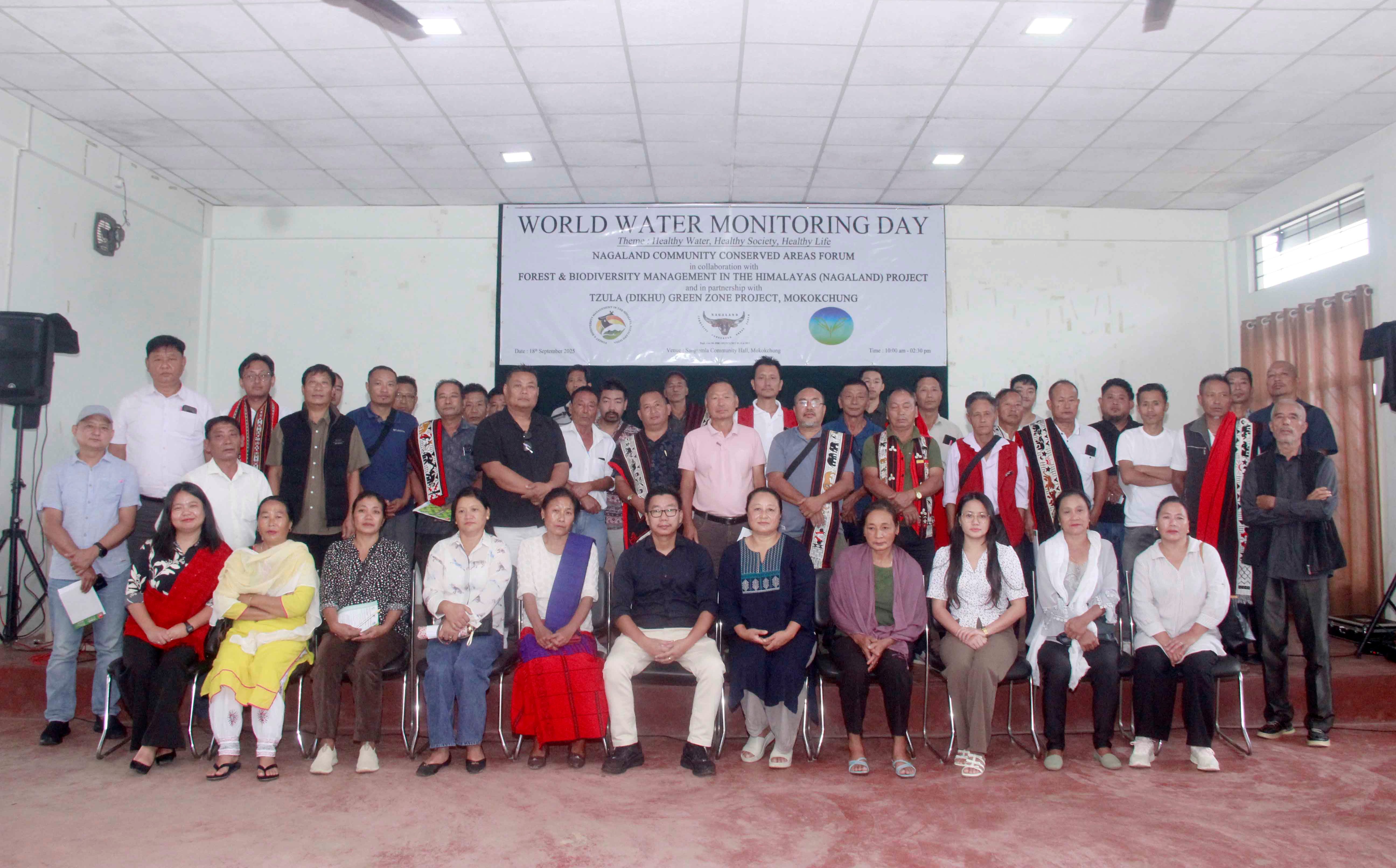THURSDAY, SEPTEMBER 18, 2025
- Home
- Mokokchung observes World Water Monitoring Day
Mokokchung observes World Water Monitoring Day
Mokokchung observes World Water Monitoring Day on the theme ‘Healthy water, healthy society, healthy life.’
Share

MOKOKCHUNG — World Water Monitoring Day was observed in Mokokchung on the theme ‘Healthy water, healthy society, healthy life’ on Thursday.
The event, organised by the Nagaland Community Conserved Area Forum (NCCAF), in collaboration with the Forest & Biodiversity Management in the Himalayas (Nagaland) Project and the Tzula (Dikhu) Green Zone Project, took place at Sangtemla community hall.
Over 50 representatives from villages across Mokokchung district, including Longsa, Merangkong, Ungma, Aliba, Khensa, Longmisa, Mokokchung village, Mekuli, Chubayimkum, Chungtia, Kinunger, Moa Lenden, Mopungchuket, and Longpa, attended the programme.
Also read: Health outreach camp held in Kijumetouma village
Special guest Ajay Moktan, Assistant Commissioner of Mokokchung, in his address, described the theme as a call to action, stating water’s critical role in agriculture, health, and cultural practices.
“Without water, we cannot grow food. Without clean water, our children fall sick with diarrhoea, typhoid, or jaundice. Without water, even our festivals, rituals, and community feasts cannot happen,” he stated while citing United Nations’ declaration of water as a human right and Prime Minister Narendra Modi’s vision, “Jal hai toh Jeevan hai, Jal hai toh Kal hai” (If there is water, there is life and future).
Mokta also highlighted local challenges, noting that despite heavy rainfall in areas like Mokokchung and Darjeeling, water shortages persist due to inadequate management, with 75% water coverage still failing to meet demand.
Globally, he cited the United Nations World Water Development Report 2023, which indicates that 2.2 billion people lack safely managed drinking water, with 40% of the world population potentially facing scarcity by 2030.
He linked water security to Sustainable Development Goal 6, stressing its role in health, education, and gender equality, and warned of climate change’s impact, including erratic rainfall and floods, as per IPCC reports.
Moktan lauded the Jal Jeevan Mission’s goal to provide tap water to every rural household by 2024, noting Nagaland’s progress, including Mokokchung.
He also highlighted the Catch the Rain Campaign and Amrit Kaal vision, which tie water security to national prosperity.
To the farmers, he urged wise water use through methods like drip irrigation, protection of water sources via tree planting, and rainwater harvesting with contour trenches or check dams, emphasizing their role as “jaladata” (guardians of water).
Locally, Moktan pointed to Nagaland’s community conservation ethos, citing declining spring discharge in Mokokchung due to deforestation and climate variation as a warning.
He referenced the Tzula (Dikhu) river basin’s importance and shared an anecdote from Sendenyu village in Kohima, where a 700-hectare biodiversity reserve sustains springs.
For the way forward, Moktan advocated monitoring water quality, empowering women and youth in governance, integrating traditional and modern techniques, and linking water management to public health to prevent diseases like cholera.
He concluded with a pledge to conserve springs, educate children on water’s value, and make Mokokchung a water-secure model district.
The technical session featured speakers, including Hebo Zhimomi, Executive Engineer, PHED Mokokchung division, on ‘Healthy water, healthy society, healthy life;’ and Dr. Temjensangla, Associate Professor of Department of Geography, Fazl Ali College, on ‘Conservation and water;’ Tokugha, vice president of NCCAF; and Imliyanger Jamir, chairman of Tzula (Dikhu) Green Zone Project. The event concluded with Q&A between the speakers and participants.

